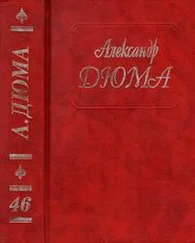"I wish his eminence to become pope on the first opportunity, allowing me then the right of demanding full indulgences for myself and my friends."
Mazarin made a grimace which was quite indescribable, and then turned to D’Artagnan.
"And you, sir?" he said.
"I, my lord," answered the Gascon, "I differ from Monsieur d’Herblay entirely as to the last point, though I agree with him on the first. Far from wishing my lord to quit Paris, I hope he will stay there and continue to be prime minister, as he is a great statesman. I shall try also to help him to down the Fronde, but on one condition—that he sometimes remembers the king’s faithful servants and gives the first vacant company of musketeers to a man that I could name. And you, Monsieur du Vallon―"
"Yes, you, sir! Speak, if you please," said Mazarin.
"As for me," answered Porthos, "I wish my lord cardinal, in order to do honor to my house, which gives him an asylum, would in remembrance of this adventure erect my estate into a barony, with a promise to confer that order on one of my particular friends, whenever his majesty next creates peers."
"You know, sir, that before receiving the order one must submit proofs."
"My friends will submit them. Besides, should it be necessary, monseigneur will show him how that formality may be avoided."
Mazarin bit his lips; the blow was direct and he replied rather dryly:
"All this appears to me to be ill conceived, disjointed, gentlemen; for if I satisfy some I shall displease others. If I stay in Paris I cannot go to Rome; if I became pope I could not continue to be prime minister; and it is only by continuing prime minister that I can make Monsieur d’Artagnan a captain and Monsieur du Vallon a baron."
"True," said Aramis, "so, as I am in a minority, I withdraw my proposition, so far as it relates to the voyage to Rome and monseigneur’s resignation."
"I am to remain minister, then?" said Mazarin.
"You remain minister; that is understood," said D’Artagnan; "France needs you."
"And I desist from my pretensions," said Aramis. "His eminence will continue to be prime minister and her majesty’s favorite, if he will grant to me and my friends what we demand for France and for ourselves."
"Occupy yourselves with your own affairs, gentlemen, and let France settle matters as she will with me," resumed Mazarin.
"Ho! ho!" replied Aramis. "The Frondeurs will have a treaty and your eminence must sign it before us, promising at the same time to obtain the queen’s consent to it."
"I can answer only for myself," said Mazarin. "I cannot answer for the queen. Suppose her majesty refuses?"
"Oh!" said D’Artagnan, "monseigneur knows very well that her majesty refuses him nothing."
"Here, monseigneur," said Aramis, "is the treaty proposed by the deputation of Frondeurs. Will your eminence please read and examine?"
"I am acquainted with it."
"Sign it, then."
"Reflect, gentlemen, that a signature given under circumstances like the present might be regarded as extorted by violence."
"Monseigneur will be at hand to testify that it was freely given."
"Suppose I refuse?"
"Then," said D’Artagnan, "your eminence must expect the consequences of a refusal."
"Would you dare to touch a cardinal?"
"You have dared, my lord, to imprison her majesty’s musketeers."
"The queen will revenge me, gentlemen."
"I do not think so, although inclination might lead her to do so, but we shall take your eminence to Paris, and the Parisians will defend us."
"How uneasy they must be at this moment at Rueil and Saint Germain," said Aramis. "How they must be asking, ’Where is the cardinal?’ ’What has become of the minister?’ ’Where has the favorite gone?’ How they must be looking for monseigneur in all corners! What comments must be made; and if the Fronde knows that monseigneur has disappeared, how the Fronde must triumph!"
"It is frightful," murmured Mazarin.
"Sign the treaty, then, monseigneur," said Aramis.
"Suppose the queen should refuse to ratify it?"
"Ah! nonsense!" cried D’Artagnan, "I can manage so that her majesty will receive me well; I know an excellent method."
"What?"
"I shall take her majesty the letter in which you tell her that the finances are exhausted."
"And then?" asked Mazarin, turning pale.
"When I see her majesty embarrassed, I shall conduct her to Rueil, make her enter the orangery and show her a certain spring which turns a box."
"Enough, sir," muttered the cardinal, "you have said enough; where is the treaty?"
"Here it is," replied Aramis. "Sign, my lord," and he gave him a pen.
Mazarin arose, walked some moments, thoughtful, but not dejected.
"And when I have signed," he said, "what is to be my guarantee?"
"My word of honor, sir," said Athos.
Mazarin started, turned toward the Comte de la Fere, and looking for an instant at that grand and honest countenance, took the pen.
"It is sufficient, count," he said, and signed the treaty.
"And now, Monsieur d’Artagnan," he said, "prepare to set off for Saint Germain and take a letter from me to the queen."
88.
Shows How With Threat and Pen More is Effected Than by the Sword.
D’Artagnan knew his part well; he was aware that opportunity has a forelock only for him who will take it and he was not a man to let it go by him without seizing it. He soon arranged a prompt and certain manner of traveling, by sending relays of horses to Chantilly, so that he might be in Paris in five or six hours. But before setting out he reflected that for a lad of intelligence and experience he was in a singular predicament, since he was proceeding toward uncertainty and leaving certainty behind him.
"In fact," he said, as he was about to mount and start on his dangerous mission, "Athos, for generosity, is a hero of romance; Porthos has an excellent disposition, but is easily influenced; Aramis has a hieroglyphic countenance, always illegible. What will come out of those three elements when I am no longer present to combine them? The deliverance of the cardinal, perhaps. Now, the deliverance of the cardinal would be the ruin of our hopes; and our hopes are thus far the only recompense we have for labors in comparison with which those of Hercules were pygmean."
He went to find Aramis.
"You, my dear Chevalier d’Herblay," he said, "are the Fronde incarnate. Mistrust Athos, therefore, who will not prosecute the affairs of any one, even his own. Mistrust Porthos, especially, who, to please the count whom he regards as God on earth, will assist him in contriving Mazarin’s escape, if Mazarin has the wit to weep or play the chivalric."
Aramis smiled; his smile was at once cunning and resolute.
"Fear nothing," he said; "I have my conditions to impose. My private ambition tends only to the profit of him who has justice on his side."
"Good!" thought D’Artagnan: "in this direction I am satisfied." He pressed Aramis’s hand and went in search of Porthos.
"Friend," he said, "you have worked so hard with me toward building up our fortune, that, at the moment when we are about to reap the fruits of our labours, it would be a ridiculous piece of silliness in you to allow yourself to be controlled by Aramis, whose cunning you know—a cunning which, we may say between ourselves, is not always without egotism; or by Athos, a noble and disinterested man, but blase, who, desiring nothing further for himself, doesn’t sympathize with the desires of others. What should you say if either of these two friends proposed to you to let Mazarin go?"
"Why, I should say that we had too much trouble in taking him to let him off so easily."
"Bravo, Porthos! and you would be right, my friend; for in losing him you would lose your barony, which you have in your grasp, to say nothing of the fact that, were he once out of this, Mazarin would have you hanged."
Читать дальше






![О Генри - Через двадцать лет [After Twenty Years]](/books/415401/o-genri-cherez-dvadcat-let-after-twenty-years-thumb.webp)





